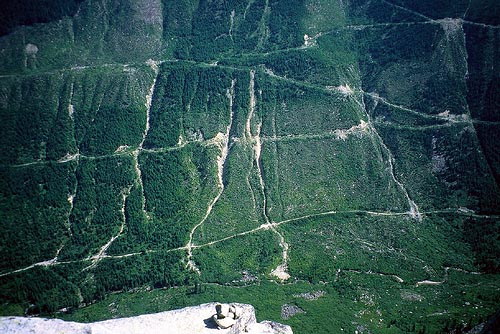Marine biologist Alexandra Morton is determined to protect wild salmon, but other determined environmentalists like Colleen McCrory, Vicky Husband, Tzeporah Berman wanted to protect British Columbia’s forests, and industry prevailed. So what must Ms. Morton do differently?
Driving anywhere along B.C.’s Gulf of Georgia you are bound to see a logging truck full of second-growth trees heading for processing to export. These are 70- to 90-year-old fir, cedar and hemlock mostly, but a fair percentage are 40- to 70-year-old trees too.
For millennia these forests were ecosystems that included trees and systems many hundreds of years old.
Returning the radically clearcut forests that surround us towards this historic structure, health, and productivity, would be in everybody’s long-term best interest according to the prevailing forest science (Google Robert O. Curtis or find his work on extended rotations in PAC NW forests at the library, for only the best example).
We should let these damaged forests regrow with only minor controlled thinning until they are at least in age classes over 120 years and then use only appropriate logging methods within ecologically safe cutting levels to produce valuable timber — finer grained timber from 120-year-plus trees is approximately twice as valuable today as the present immature logs. This will help hasten the development of old-growth characteristics and, most importantly, health, resilience and normal production of nature’s services.
Instead we are taking these already seriously degraded forests and liquidating their regrowth on radically short rotations that only benefit a few today and rob many future generations of opportunity and services too important to adequately quantify. Use Google Maps to zoom down anywhere around the Gulf of Georgia to witness the ongoing destruction and loss.
Why do we allow this rip off, this inter-generational tragedy, this stupidity to happen in publicly owned forests (and on so recently created ‘private’ forest lands with even less minimal regulation)? Are we this selfish, uncaring and stupid? Yes, our action in logging second growth for export is clearly a failure to govern ourselves in due diligence to future generations. Logging this second growth today is as clear and informing a look at who we are and how we act as if we were caught with our hand in the cookie jar.
The B.C. forest industry is a prime example of our failure to govern ourselves with due diligence to future generations. B.C. political scientists such as Jeremy Wilson and Jeremy Rayner explained the failed forestry revolution of the 1990s by showing how sunk costs and acute path dependence shrank the policy space severely limiting needed change:
A century of forest industry development (accelerated by the Sloan Commissions recommendation of the sustained yield framework after WW2) built up industry harvesting and milling capacity to at least several times an ecologically sustainable level; based upon this inflated harvesting premise forestry dependent communities grew throughout the province. When emerging ecological forest science in the 1980s challenged this inflated harvesting schedule it was far too late to shift to alternative policy paths, too late to change to an ecosystem sustainable forestry.
Now entering a second decade after the failed “Harcourt era” forestry revolution, the forest industry continues to spiral down in increasingly degraded forests. Immature, 40 to 90 year old second growth is being mowed down for export and the last previously unreachable stands of old growth fir and other incredibly valuable timber are being heli-logged for the profit of money men in New York and Tokyo. There will be little opportunity for future generations from B.C. forests and nature’s services like water regulation and, very importantly, carbon sequestering, continue to be severely impacted.
We are liquidating our regrowing second growth forests today because we built up an industry demand for huge volumes of wood and the industry that developed down this path can make money today by exporting these immature logs. Timberwest, Interfor, Island Timber, Western, etc have long term contracts for volumes of B.C. timber and we can’t afford another serious forestry recession. Period.
Now in our present It’s-the-economy-stupid governance we can’t change paths because the forest industry — as if it is the wild salmon threatening salmon farming industry — is a protected species, immune from any government regulation that would now negatively impact bottom lines, jobs, and therefore electability.
British Columbians were fooled by the cynical industry and government greenwashing of continuing business as usual in the 90s. There were real lessons that we needed to learn then that we better learn fast now:
We have long since given up our ability to regulate industry — any established industry in B.C. — to ensure due diligence to future generations.
And deregulating to control by market forces alone just pushes us further down decades old economic paths that are obviously now not be in our long-term interest.
Paths that might be very harmful to future generations. Paths like the car/sprawl/consumer economy path. Paths that could even lead to unthinkable catastrophe unless we find a way to escape our present business as usual with its ideology, government in golden straitjackets, and laminate of investments stretching into the future creating technological and policy path dependence.
Our lost ability to govern ourselves is extremely important if you recognize how climate change threatens our kids very future.
Climate change will be the subject of the concluding essay of this series. Climate change and our present governance straitjacket. Tree farming and salmon farming are tragic examples of obvious mistakes that we can’t get out of. Ms. Morton has a big heart, wisdom and enormous energy but she can’t protect salmon unless we take back our ability to properly govern ourselves.
Bill Henderson is an activist who lives in Gibsons, B.C. He can be reached by email.



